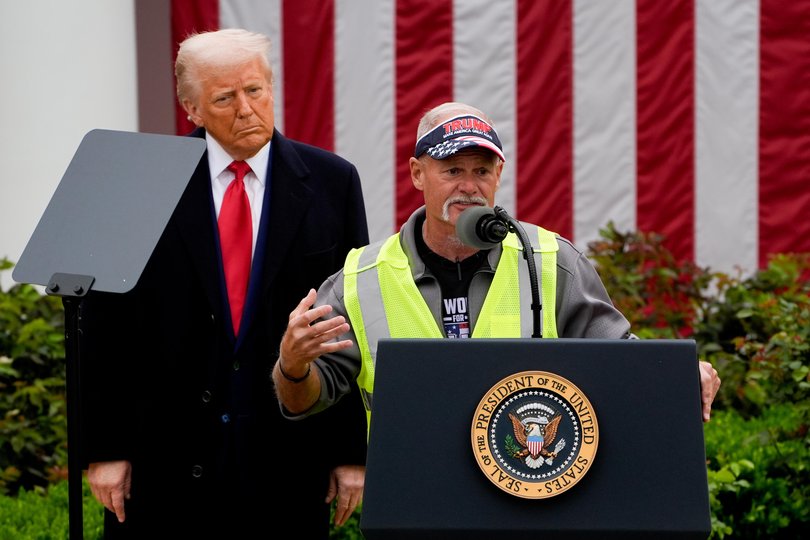Environmental, social, governance principles revised in MAGA era: How ESG lost the people
‘ESG wasn’t a political slogan,’ one expert told an investment conference. ‘It wasn’t for regular, ordinary people.’

The man who coined the term ESG (environmental, social, governance) as a core principle of responsible investing says it was never intended to become a catchcry beyond the asset management industry, which made it vulnerable to a voter-led backlash.
Paul Clements-Hunt, who created the term in 2004 while working for the United Nations said the aim was to create a framework for asset managers to understand that would be “directed down the chain” to corporations, and he deliberately inserted the term ‘social’ to remind asset managers that the goal of managing risk was to protect communities.
“ESG wasn’t a political slogan. It wasn’t for regular, ordinary people. It was to embed it in the asset owners,” Mr Clements-Hunt told attendees at the Responsible Investment Association of Australia conference, “and I’m sure you’ll agree you are not ordinary people are you?
Sign up to The Nightly's newsletters.
Get the first look at the digital newspaper, curated daily stories and breaking headlines delivered to your inbox.
By continuing you agree to our Terms and Privacy Policy.“S is in the middle for a reason. You don’t get the S if you don’t bring the blue collar workers along. If you don’t show them a pathway, you’re going to fail in all of it.”
Timothy Lynch, Professor of American Politics at the University of Melbourne, said the failure to communicate the value of ESG programs compounded the effects of economic policies that outsourced jobs to lower-cost countries. It also made the concept an easy target for attack.
Combined with concepts like diversity, equity and inclusion, which he said led some on the Left to attack disaffected workers as “deplorables,” Mr Lynch said many voters felt that not only were they poorer, they were also culturally relegated. “It’s a recipe for Donald Trump,” he said.
“ESG is a terrible advertisement for what it is trying to do,” Mr Lynch said.
“Social gets defined from the left rather than from the right, it requires management by elites, it requires huge subsidies.
“If you want the most effective acronym in the world today, it’s MAGA. MAGA displaced ESG and made it look small and elite driven.”
Mr Lynch said ESG policies under then-President Joe Biden were driving a massive uptake in renewables, mainly sourced from China, and had a become a lightning rod for Republicans worried about national security.
The push by asset managers and the Biden administration for better environmental outcomes was also a key factor in American car companies having to retool for better fuel efficiency or develop electric vehicles, threatening autoworker jobs.
At Donald Trump’s ‘Liberation Day’ tariff announcement, 20 Detroit autoworkers were in the audience. One described how he “watched plant after plant after plant in the Detroit area close.”

The backlash against ESG was a key topic at the conference, with US fund managers increasingly hesitant to include any reference to the policy in their investment pitches.
Maria Lettini, chief executive of the US Sustainable Investment Forum, said fund managers were walking a “tightrope,” trying to satisfy fiduciary commitments while facing potential sanction from the US Government, which has formally rejected the UN Sustainable Development Goals.
“Firms are removing the acronyms and they’re scrubbing their websites. It’s been a huge challenge, especially if they’re working across markets,” Ms Lettini said.
The backlash predates the current Trump administration, having already taken root in several Republican-led states.
That has contributed to significant net outflows of so-called “sustainable” funds in the US in the last two years, accounting for $US20 billion in the last 12 months. April’s drawdown of $US5b was the worst in over a year, according to Morningstar.
European investors shunned the sector for the first time in since at least 2018 in the first quarter of 2025, pulling $US1.2bn.
Australian investors continue to support the sector, contributing $US305 million in the past quarter.
According to a superannuation asset manager who asked not to be named, appetite for ESG-related investments has waned, with investment committees prioritising returns during a period of poor performance, high global interest rates and market volatility.
The fund manager said the ESG backlash had given super funds cover to de-prioritise such investments.
But Mr Clements-Hunt said the tide back to ESG may already be turning, driven by the excesses of the Trump administration and his association with libertarian tech leaders.
“Trump is the best possible advert for ESG, particularly the G at the governance level. He’s an expensive advert, but he is the best advert for what you get if you get economics wrong, and it’s too excessive,” he said.
“Take Elon Musk. It’s not a good look to have the richest man in the world removing retroviral vaccines from children in Africa. For every action, there is a reaction, and that plays out in political sociology and political economy.”
Ultimately, Mr Clements-Hunt said, the weight of need would decide how money would be allocated.
With the Western world increasingly shrinking in terms of population, funding infrastructure in fast-growing regions like Africa would become a priority, particularly if the alternative was protecting borders from waves of economic or environmental migrants.
“What the financial system needs is more creativity to drive money to the places where it’s needed and get the 80 per cent of wealth out of 10 per cent of markets.
“Big money now has made a bet that you will make more money out of saving the planet than you will destroying it,” he said.

